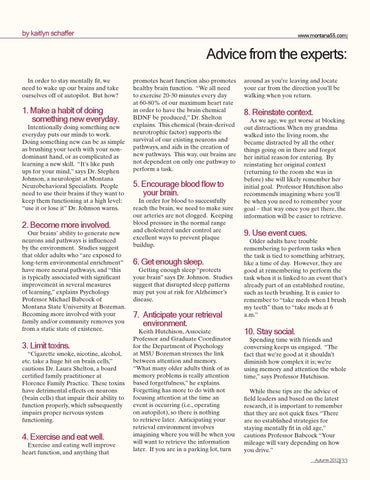by kaitlyn schaffer
www.montana55.com
Advice from the experts: In order to stay mentally fit, we need to wake up our brains and take ourselves off of autopilot. But how?
1. Make a habit of doing something new everyday.
Intentionally doing something new everyday puts our minds to work. Doing something new can be as simple as brushing your teeth with your nondominant hand, or as complicated as learning a new skill. “It’s like push ups for your mind,” says Dr. Stephen Johnson, a neurologist at Montana Neurobehavioral Specialists. People need to use their brains if they want to keep them functioning at a high level: “use it or lose it” Dr. Johnson warns.
2. Become more involved.
Our brains’ ability to generate new neurons and pathways is influenced by the environment. Studies suggest that older adults who “are exposed to long-term environmental enrichment” have more neural pathways, and “this is typically associated with significant improvement in several measures of learning,” explains Psychology Professor Michael Babcock of Montana State University at Bozeman. Becoming more involved with your family and/or community removes you from a static state of existence.
3. Limit toxins.
“Cigarette smoke, nicotine, alcohol, etc. take a huge hit on brain cells,” cautions Dr. Laura Shelton, a board certified family practitioner at Florence Family Practice. These toxins have detrimental effects on neurons (brain cells) that impair their ability to function properly, which subsequently impairs proper nervous system functioning.
4. Exercise and eat well.
Exercise and eating well improve heart function, and anything that
promotes heart function also promotes healthy brain function. “We all need to exercise 20-30 minutes every day at 60-80% of our maximum heart rate in order to have the brain chemical BDNF be produced,” Dr. Shelton explains. This chemical (brain-derived neurotrophic factor) supports the survival of our existing neurons and pathways, and aids in the creation of new pathways. This way, our brains are not dependent on only one pathway to perform a task.
5. Encourage blood flow to your brain.
In order for blood to successfully reach the brain, we need to make sure our arteries are not clogged. Keeping blood pressure in the normal range and cholesterol under control are excellent ways to prevent plaque buildup.
6. Get enough sleep.
Getting enough sleep “protects your brain” says Dr. Johnson. Studies suggest that disrupted sleep patterns may put you at risk for Alzheimer’s disease.
7. Anticipate your retrieval environment.
Keith Hutchison, Associate Professor and Graduate Coordinator for the Department of Psychology at MSU Bozeman stresses the link between attention and memory. “What many older adults think of as memory problems is really attention based forgetfulness,” he explains. Forgetting has more to do with not focusing attention at the time an event is occurring (i.e., operating on autopilot), so there is nothing to retrieve later. Anticipating your retrieval environment involves imagining where you will be when you will want to retrieve the information later. If you are in a parking lot, turn
around as you’re leaving and locate your car from the direction you’ll be walking when you return.
8. Reinstate context.
As we age, we get worse at blocking out distractions. When my grandma walked into the living room, she became distracted by all the other things going on in there and forgot her initial reason for entering. By reinstating her original context (returning to the room she was in before) she will likely remember her initial goal. Professor Hutchison also recommends imagining where you’ll be when you need to remember your goal – that way once you get there, the information will be easier to retrieve.
9. Use event cues.
Older adults have trouble remembering to perform tasks when the task is tied to something arbitrary, like a time of day. However, they are good at remembering to perform the task when it is linked to an event that’s already part of an established routine, such as teeth brushing. It is easier to remember to “take meds when I brush my teeth” than to “take meds at 6 a.m.”
10. Stay social.
Spending time with friends and conversing keeps us engaged. “The fact that we’re good at it shouldn’t diminish how complex it is; we’re using memory and attention the whole time,” says Professor Hutchison. While these tips are the advice of field leaders and based on the latest research, it is important to remember that they are not quick fixes. “There are no established strategies for staying mentally fit in old age,” cautions Professor Babcock “Your mileage will vary depending on how you drive.” Autumn 2012
33
